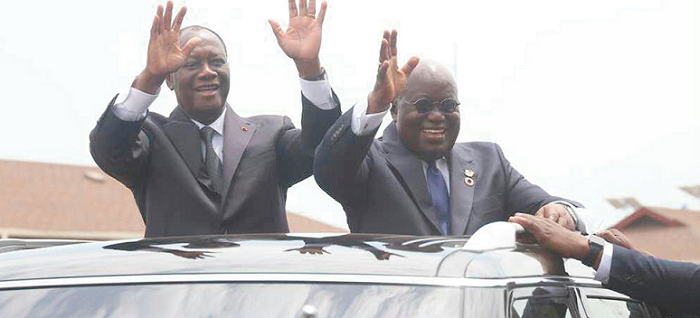
Ghana-Cote d’Ivoire bilateral relations - Implications for growth
It is very heart-warming that Ghana and Cote d’Ivoire, contrary to a possible mounting of tension between them following the recent ruling by the International Tribunal for the Law of the Sea in relation to the maritime boundary dispute between the two countries, have by conduct and behaviour resorted to the strengthening of their bilateral relations.
Both countries prefer to seek peaceful co-existence rather than a build-up of needless and meaningless ferocious, abrasively antagonistic relationship with each other as demonstrated by the two-day visit to Ghana by the Ivorian leader, His Excellency, Alassane Ouattara. The visit by the Ivorian leader is to reciprocate the one made to Cote d’Ivoire by President Akufo-Addo during his West African tour in May this year.
The purpose of the visit is for the leaders of the two countries to further deepen the already strong relations existing between Ghana and Cote d’Ivoire. It is also intended to explore other areas of co-operation between the two countries for the maximisation of their mutual benefits.
Common agenda
The desire to pursue a common agenda of peace shows a demonstration of maturity on the part of the two leaders of the West-African countries.
This desire to co-exist peacefully has been influenced by certain economic and political factors. To begin with, both Ghana and Cote d’Ivoire are at the same level of economic development. They are developing countries that produce over 60 per cent of the world’s cocoa output.
On the basis of this, the two countries as the largest suppliers of the commodity on the world market can come together to co-ordinate their policies on cocoa production so as to curb the fall in revenues derived from cocoa exports, thereby protecting the interest of cocoa producers in the two countries and seeking better lives for them. Similarly, they stand the chance of exploring other economic avenues that can be made beneficial to each other.
Political factors
With regard to the political factors influencing the relationship between the two countries, the issue of peaceful coexistence and the pursuance of the common interest of the people of Ghana and Cote d’Ivoire readily come to mind.
The people of the two countries are in great support of the agenda for peace. The conduct of the two leaders is, therefore, strictly in line with the wishes of their own people.
Related to this is the issue of security. Without peace and security between the two countries, there will be no economic development. The choice of peace and security is an agenda that provides adequate grounds for the pursuance of meaningful bilateral relations and economic growth.
Furthermore, the nature of the two states as well as the interests of their respective governments shows a high level of maturity on the part of the two leaders. The countries are found in the same geographical region of West Africa, sharing common ethnic ties and bound by a common culture. In the light of all these, it is important that the two countries agree to live as good neighbours to pursue a common agenda for the people of their respective countries.
In pursuing a common agenda of peace and economic growth, however, it is important for the two leaders to involve their people in this fraternal relationship at various levels. This is necessary for a realistic unity of purpose between Ivoirians and Ghanaians within the sub-region.
Unity and bilateral relations must not only stay at the top, but also between the two nationals in both countries. If this is effectively carried out, it will send clear signals to other countries in the sub-region, and indeed the rest of Africa, to come together in a realistic manner for the pursuance of a common agenda of unity and purpose.
The co-operation between these countries under what has become known as “Agreement for a Strategic Partnership” is expected to result in closer intimacy to protect the interests of the two countries. These countries must send positive signals to the rest of the world that they mean real business and are prepared to collaborate with each other politically, economically and strategically to promote the agenda of growth for the two countries.
